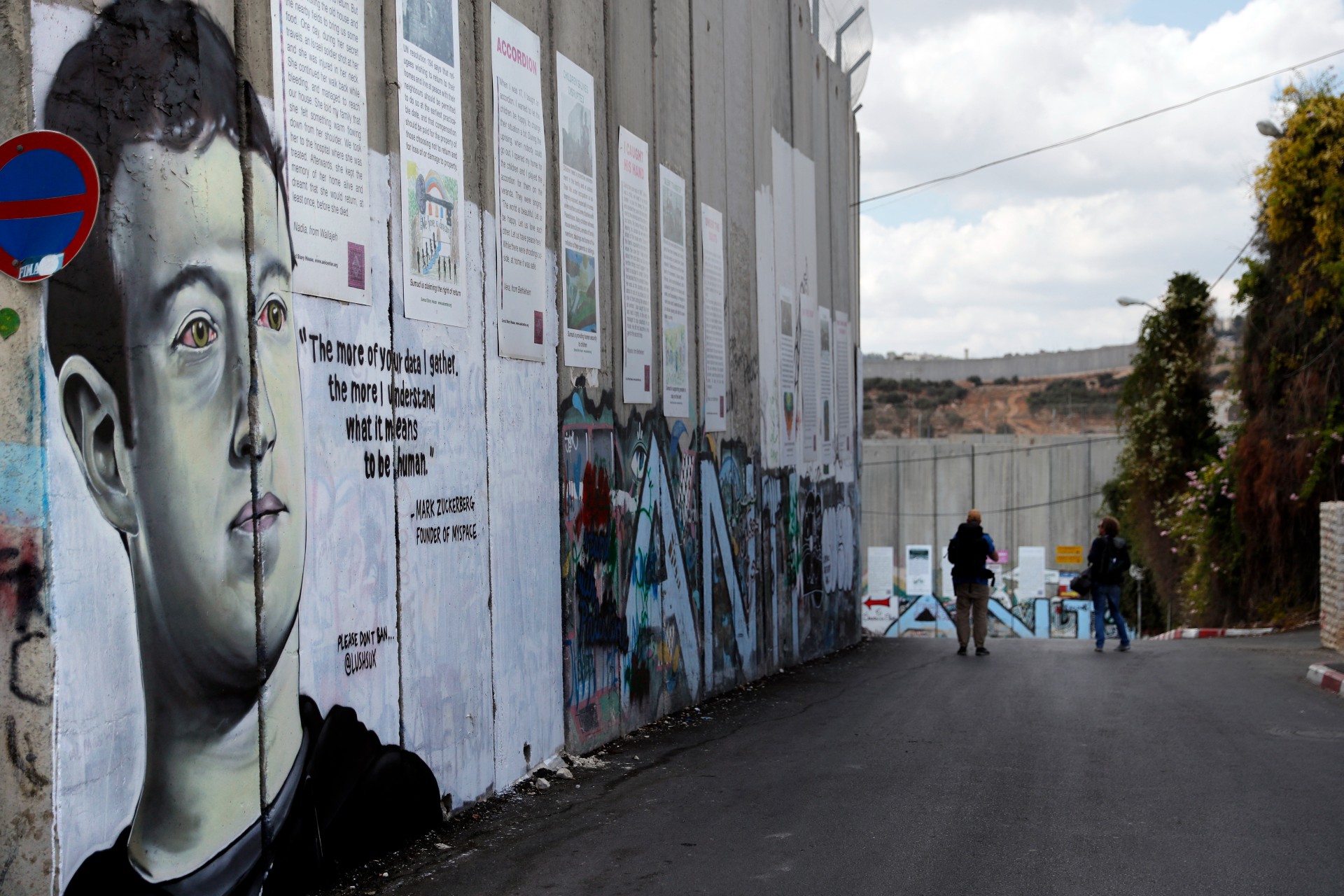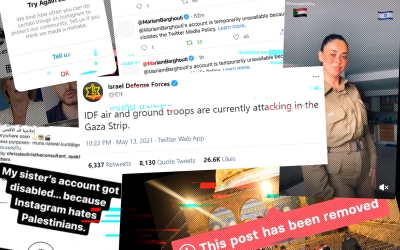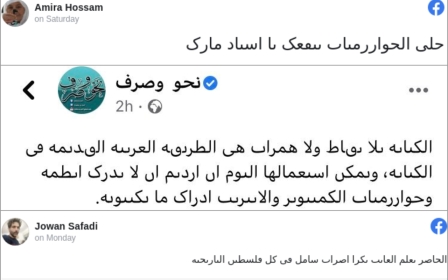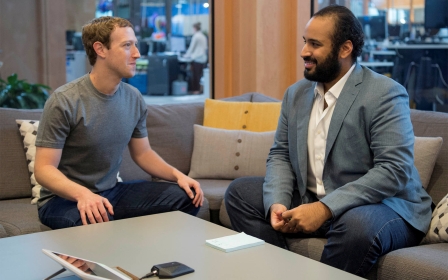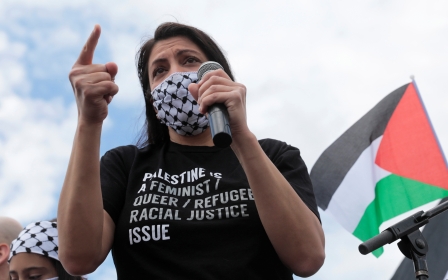Think Facebook's review will fix alleged Israeli bias? Not so fast, say Palestinians
Palestinian digital rights advocates have welcomed Facebook's Oversight Board's call for an independent review into alleged bias in the tech giant's moderation of Palestinian and Israeli posts.
But not so fast, they say. While the review is long overdue, the platform still has a way to go before it is moderated fairly and transparently, and it remains to be seen if the company will act on the board's recommendations.
The board's report, released last week, came after an uproar in May when Facebook, Instagram (also owned by the tech giant) and Twitter were accused of censoring Palestinians and their supporters following the removal of hundreds of pro-Palestinian posts, often without explanation.
It wasn’t the first time the social media platforms, their moderators and algorithms have been accused of stifling the free speech of Palestinians.
But the alleged censorship came at a critical moment for Palestinians, as multiple events - threatened expulsions in Jerusalem's Sheikh Jarrah, the storming by Israeli soldiers of Al-Aqsa Mosque, an 11-day offensive in Gaza and intercommunal violence in Palestinian-majority cities in Israel - unfolded in quick succession.
New MEE newsletter: Jerusalem Dispatch
Sign up to get the latest insights and analysis on Israel-Palestine, alongside Turkey Unpacked and other MEE newsletters
The platforms, digital advocates have said, are often the "only tools" to stay safe "in the face of repression by the Israeli government and police, and during attacks on civilians". They are also used for documenting human rights violations.
The report focused on one particular post that moderators took down and later reinstated - an Al Jazeera Arabic story about the Izz al-Din al-Qassam Brigades that an Egyptian user had reposted with the comment "Ooh" - but offered recommendations that have wider implications for the moderation of Palestinian and Israeli content.
For the independent review into alleged bias, the board said that the reviewer should not be "associated with either side of the Israeli-Palestinian conflict" and should examine both human and automated content moderation in Arabic and Hebrew.
One major concern among digital advocates is the degree to which Facebook is removing Palestinian content at the request of both the Israeli government, including the justice ministry's cyber unit, and a highly organised network of volunteers who report pro-Palestinian content.
The board took up this question, asking Facebook during its investigation whether the company had received official or unofficial requests from Israel to remove content in April and May.
The company responded that it hadn't received "a valid legal request" from a government authority in the case of one particular post which the board's report focused on. The company "declined to provide the remaining information requested by the board".
On this issue, the board recommended that the independent reviewer should follow up and that Facebook should offer "greater transparency with regard to its treatment of government requests".
Facebook said it welcomed the board's report and would update its comments "after conducting a review of the recommendations provided by the board in addition to their decision".
Questionable action
Several Palestinian digital rights advocates told Middle East Eye that the recommendations reflect concerns they have shared repeatedly with the company over the years to no end.
"I hope it will make a positive change to get us our digital rights because, until now, we didn't have anything else to do, unfortunately," said Eyad Rifai, director of Sada Social, a digital advocacy group.
Rifai said since 2017, his organisation has sent a monthly list to Facebook of Palestinian accounts and pages that have been taken down, most of which were removed by mistake.
But content, he said, continued to come down. Sada Social, along with two news agencies and a translator, sent a legal complaint to Facebook in May. But according to Rifai, the company responded saying, once again, that pages and content had been removed mistakenly.
He said Sada Social now plans to send Facebook its master list of hundreds of pages and content that have been removed.
'It's positive, but obviously there is a long way for Facebook to go until we reach a place where we can say that they have an equal, objective and transparent policy towards all users'
- Nadim Nashif, 7amleh
In just the past month alone, he said, Sada Social has recorded 50 questionable actions against Palestinian content by Facebook and other social media platforms, including the shutting down of the Facebook page of Al-Awda TV, a channel linked to the Fatah movement, which rules the Palestinian Authority. "It's still happening," he said.
But with the board's report, particularly its call for an independent review, and more attention on the issue than ever before, Rifai said he hopes this will be the moment the company is forced to reform.
"At some point, they have to take these recommendations because in the last month, all the world is talking about this and a lot of organisations are making pressure about this issue," Rifai said.
Nadim Nashif, executive director of 7amleh, an organisation that focuses on the advancement and protection of Palestinian digital rights, said the board's report is "some kind of turning point".
"Their decision is actually a good one, relatively to Facebook, and Facebook-related bodies," he said. "It has incited criticism actually towards Facebook."
Nashif said Palestinian digital rights advocates previously had concerns over the board, particularly the participation of Emi Palmor who once headed the Israeli justice ministry's cyber unit, which is said to flag for removal thousands of posts and accounts from social media platforms annually.
7amleh, among other organisations, campaigned against her appointment. But Nashif said, despite meetings with several Facebook representatives, the company "never took our concern in a serious way".
"But in any case, that's why we are a bit surprised with the decision now, because they took things from us, from the digital rights community and organisations, that we were calling for."
He said, in particular, he thought it was a good sign that the board reported that the company had declined to hand over information about content removal requests from Israel.
"It's positive, but obviously there is a long way for Facebook to go until we reach a place where we can say that they have an equal, objective and transparent policy towards all users," he said.
Power gap
Rabea Eghbariah is an attorney who represented Adalah, a legal rights group for Palestinian citizens of Israel, in a case against the cyber unit at the Israeli supreme court earlier this year. He also welcomed what he described as an "unexpected" report.
But he said he was concerned that the report's recommendation of an outside review treats the situation with "both-sideism rhetoric" that he finds problematic "when you have such bias".
"You have obviously two unequal sides... One is an advanced military state with the resources and access to Facebook." The other, Eghbariah said, is suppressed people who are often "only organising on a grassroots level".
"There is an inherent power gap here that Facebook is treating with a both-sideism kind of approach and the oversight board is treating it [with a] both-sideism kind of approach," he added.
But he said it became clear this May that "this is not a both-sides issue".
"The dam has been broken in the sense that unapologetic Palestinian voices have reached mainstream consciousness and mainstream outlets where we no longer accept the both side logic that is constantly applied to Palestinians to basically suppress their claims," he said.
Eghbariah said he hopes the report will trigger broader engagement with Palestinian users.
"If you really genuinely want to solve a problem, you have to genuinely hear the concerns of Palestinians and also give them the power to change their own reality."
Dani Noble, campaign organiser at Jewish Voice for Peace, one of 31 organisations backing the "Facebook, we need to talk" campaign launched earlier this year, said the positive reception from Palestinian digital rights experts was a sign that the board's report was "a step in the right direction".
Yet while the report touched on the "privileged relationship" between Facebook and the cyber unit, Facebook, she said, "still refuses to clarify the nature of this relationship".
"Facebook should work towards rebuilding trust with its users by providing such transparency, and we hope the Oversight Board will continue to call attention to this problematic relationship," Noble said.
Middle East Eye delivers independent and unrivalled coverage and analysis of the Middle East, North Africa and beyond. To learn more about republishing this content and the associated fees, please fill out this form. More about MEE can be found here.



